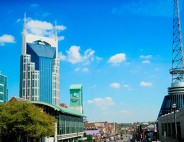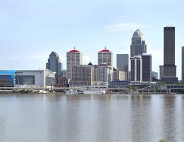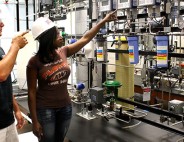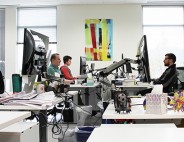
New Jersey: Downtown Touchups Jumpstart Business Community Developments
24 Mar, 2016
By David Hodes
New Jersey is pushing forward with economic development as it comes to grips with issues from the past that have stalled progress. ŌĆ£WeŌĆÖve put New JerseyŌĆÖs financial house back in order,ŌĆØ Governor Chris Christie said during his 2017 fiscal year budget speech. ŌĆ£And weŌĆÖre going to keep it that way.ŌĆØ
The first order of business is fiscal restraint, Christie said. He will limit discretionary spending to $2 billion less than in 2008, which means that 95 percent of all the growth in this budget is for pensions, government worker health benefits and debt service.
In 2016, he raised the state earned income tax credit from 20 percent to 30 percent, and his 2011 business tax reforms saved the business sector more than $3 billion.
One of the biggest efforts to help New Jersey taxpayers was the collaboration on the 2 percent property tax cap, which has brought property tax growth to a near halt, averaging less than 2 percent statewide since the cap was passed. ŌĆ£We are making real progress rolling back taxes that should never have been enacted in the first place,ŌĆØ he said.
His proposed budget includes more than $16 billion in direct and indirect property tax relief, including $13.3 billion in school aid, $1.5 billion in municipal aid and $1 billion.
Some solid business incentive programs also are used to help drive development.
One of the stateŌĆÖs more popular incentives is Grow NJ, a job creation and retention incentive program that strengthens New Jersey’s competitive edge against tax incentive programs in surrounding states.
Businesses that are creating or retaining jobs in New Jersey may be eligible for tax credits ranging from $500 to $5,000 per job, per year; bonus credits range from $250 to $3,000 per job, per year.
Another incentive program that is available through the New Jersey Economic Development Authority (EDA) is the Premier Lending program, in partnership with EDA Premier Lender banks. The EDA can provide up to 50 percent of the bank loan amount for fixed asset loans, up to 50 percent of the bank loan amount for working capital loans and up to 50 percent of the bank line of credit amount.
Under yet another incentive program, the stateŌĆÖs New Business Growth Fund, also from the EDA, applicants who meet eligibility requirements to create or maintain one full-time job in New Jersey for every $50,000 of guarantee provided by the EDA can get 100 percent loan-to-value for real estate and 90 percent for equipment.
ŌĆ£We live in a time when our national economy and the global economy face new threats,ŌĆØ Christie said. ŌĆ£New Jersey cannot stand alone. Our state has to be ready to weather the economic storms as well as the actual storms.ŌĆØ
Industries and Innovations┬Ā┬Ā
The biggest development in the past year in Mercer County is the 1.2 million-square-foot Amazon fulfillment center that opened at the Matrix Business Park in Robbinsville in summer 2014; the center now employs 2,000 full-time employees. ŌĆ£They usually hire 2,000 more for help during the holiday season,ŌĆØ Mercer County Executive Brian Hughes says. ŌĆ£They have the ability to move a million products out in a day,ŌĆØ he says.
Another company in the area, in Princeton, is NRG Energy Inc., a major renewable energy manufacturer, now building its headquarters in a new, sustainable 130,000-square-foot building.
Shiseido America is adding 45,000 square feet to its building at its 44-acre facility in East Windsor. Most of that building will be used for research and development. The remaining 14,000 square feet will be used for offices and the rest for warehouse. The company owns an additional 40 acres adjacent to its site for future expansion.
In Cumberland County, in the southwest part of the state and home to the city of Vineland, there is an ongoing legacy of agriculture.

Shiseido Ground Breaking. Mayor Janice S. Mironov and Council Members joined Shiseido America Plant Manager Ladislav Hanzes and company executives for a groundbreaking ceremony for the newest expansion by Shiseido America, INc. (SAI) of their current East Windsor facility, on Princeton Highstown Road. Pictured (from left to right) are: Council Member Hector Duke; Hiroto Morozumi, Senior Vice President of Quality, and Katsunori Yoshida, Executive Vice President, Shiseido Research Center.
This predominantly rural county has nearly 70,000 acres of farmland, with agriculture production accounting for nearly 20 percent of the state’s agricultural market value. Some of the leading fresh market vegetables in Cumberland County are summer squash, scallions, cucumbers, radishes, spinach, sweet corn and tomatoes.
Cumberland County has one of the most progressive nursery and floriculture industries in the United States, and ranks first in greenhouse, nursery, floriculture and sod production in the state.
The county as a whole has more tree nurseries than anywhere else in the country, Sandra Forosisky, director of economic development for the city of Vineland, says.
She says that the area also has the Vineland Produce auction, one of the oldest produce auctions in the country. The auction handles thousands of individual transactions during the average growing season, from early April to late November/early December year after year, which amounts to millions of packages being sold over the course of the growing season.
Forosisky says the cityŌĆÖs economic developers have facilitated many expansions, particularly among industrial businesses, citing the acquisition of Gerresheimer AGŌĆÖs pharmaceutical glass tubing business in November by Corning; the two companies formed an equity venture to accelerate Corning innovations in the pharmaceutical packaging market.
Corning and Gerresheimer have also entered into a 10-year supply agreement for borosilicate tubing. ŌĆ£They are looking at future expansion here,ŌĆØ Forosisky says. ŌĆ£So we are really excited about Corning coming into the area.ŌĆØ
Talent and Education
At his State of the County address in January, Hughes announced the Mercer County Partnership for Educational Attainment composed of a blue-ribbon panel commission of several universities and colleges to develop strategies.
Dr. Jianping Wang, the new president of Mercer County Community College, will serve as the chair of the panel. The presidents of Princeton, Rider and Thomas Edison State universities, and The College of New Jersey have also been asked to participate.
HughesŌĆÖ goal for the new commission, which also will include business leaders and other stakeholders, is to increase the percentage of the county’s workforce with a college degree. ŌĆ£All of these colleges are going to be represented on this panel, along with a lot of businesses, to really increase educational attainment,ŌĆØ he explains. ŌĆ£Because something you hear onceŌĆöyou hear it all the timeŌĆöis that companies say, ŌĆśwe canŌĆÖt find workforce.ŌĆÖ And that is why companies move. ItŌĆÖs not taxes or because something is too expensive. They need a workforce that suits their needs.ŌĆØ
Hughes says through the program, they are going to be looking at the workforce for the next five years and hope to increase educational attainment of a college degree or equivalent to one percent. ŌĆ£That would be about 2,500 people in the county that would have a college degree five years from now that donŌĆÖt have one now,ŌĆØ he says.
Assets
Hughes says that the biggest thing going on in Mercer is the building of a new airport terminal at the Trenton-Mercer airport, which began providing passenger service in 2012. The terminus is also benefitting from a $7 million investment for terminal improvements and parking lots that were paid for through airport revenue, not county taxes.
The building of a new passenger terminal, Hughes says, is linked to the county’s continuing success in expanding travel and tourism, where expenditures have reached record-setting levels. ŌĆ£The current airport is 45 years old, and for the last four years we have had flights from Frontier flying out of Mercer up and down the East Coast,ŌĆØ he says. ŌĆ£They really have expanded quite a bit,ŌĆØ he adds. ŌĆ£They went from one flight a week to now having a million people land at Mercer. So they want to help build it and take advantage of the future in the terminal,ŌĆØ Hughes says.
Industrial park development in and around Vineland should be picking up, according to Forosisky. She says that the land in and around the 69-square-mile Vineland area is relatively inexpensive for a New Jersey community. ŌĆ£But there is still industrial land that we are trying to buy up,ŌĆØ Forosisky says. ŌĆ£This is former farmland that we want to use to expand our industrial park,ŌĆØ she says.
She says that they have light industrial parks on the northwest corner of the city along New Jersey State Route 55, which traverses the city to the southeast, where a new sports complex will be built. In the middle is the downtown area. ŌĆ£There have been a few years where there has been real slow activity,ŌĆØ she says. ŌĆ£But all of a sudden now, businesses are expanding, and we are talking to new businesses.ŌĆØ
Lifestyle
Forosisky says that Vineland is undergoing a downtown revitalization, recently demolishing a whole city block on the east entrance or gateway of the city and are putting in a commercial development with shops on the first floor and 78 senior housing units on the second floor.┬Ā ŌĆ£We have been working on this plan for eight years, and itŌĆÖs finally happening,ŌĆØ she says. As part of that redevelopment, a section of an old decommissioned hospital will be demolished and redeveloped as a gated, independent living and assisted living community, catering to people with AlzheimerŌĆÖs disease.
According to Forosisky, the downtown redevelopment was going through growing pains, but they have worked through those now. ŌĆ£We are trying to get more housing in there,ŌĆØ she says. ŌĆ£In the past we didnŌĆÖt focus on housing so much because we were just doing senior apartments,ŌĆØ she notes. ŌĆ£But now, with what millennials demand with their new urban lifestyle, we see our downtown going in a different direction,ŌĆØ she says. ŌĆ£More shops, restaurants, entertainment venues and urban housing.ŌĆØ
That downtown revitalization is the same direction being pursued in Trenton, according to Hughes. In 2011, HHG Development signed a deal with Mercer County to purchase, over time, the four former Roebling Steel buildings bounded by Route 129, Hamilton Avenue, Clark Street and Elmer Street.
The plan for Phase 1 of the development was to first buy Building 101, in the southeast corner, for $1.24 million and spend about $25 million to turn it into lofts. That first phase of the project, now called Roebling Lofts, a 138-unit, multi-family rental, is now financed and under construction with delivery planned for early 2017.
Much of this development came about as the result of a master plan created by the county in 2008 to revitalize Trenton as more of a residential community with shopping and entertainment amenities. ŌĆ£So we are really spreading out in a good way, building all over the county,ŌĆØ Hughes explains.
These kinds of downtown redos are common around this heavily agricultural state, where the population is being drawn more and more to urban cores.
Forosisky says that Vineland is an Urban Enterprise Zone (UEZ) community. The UEZ program was enacted in 1983, administered by the Department of Community Affairs, and was created to revitalize designated urban communities and stimulate their growth by encouraging businesses to develop and create private sector jobs through public and private investment in the designated zones. ŌĆ£What we did with our UEZ money is created a loan portfolio,ŌĆØ she says.
With that $65 million portfolio, they are constantly looking to loan money to new businesses or help a business expand. ŌĆ£ItŌĆÖs a real asset to the community,ŌĆØ Forosisky says.
As cities and towns grow and more people look to developers for better amenities where they choose to live, economic development executives are seeing a change come over their areas of interest.
Hughes says that it wasnŌĆÖt a pretty picture in Mercer County for few years. ŌĆ£But now we are starting to see ┬ĀI think,┬Āif not a home run┬Āin terms of economic development,┬Ā more people coming into Mercer through our new airport and getting introduced to the county for the first time,ŌĆØ he says.
He says that the county is steeped in American history from both the Revolutionary War and the Industrial Revolution. ŌĆ£The wire rope for the Brooklyn Bridge was made in Trenton,ŌĆØ he adds. ŌĆ£We have this span of whole generations and centuries of revolutionary thinking here in Mercer County, and we want to continue that.ŌĆØ
For complete details on conducting business in New Jersey, visit:
Side Note
Down to Business
– The Technology Business Tax Certificate Transfer Program enables qualified, unprofitable New Jersey-based technology or biotechnology companies with fewer than 225 U.S. employees to sell a percentage of net operating losses and research and development tax credits to unrelated profitable corporations.
– The New Jersey Economic Development Authority has invested $40 million-plus into venture funds that support emerging technology companies in New Jersey.
– The Higher Education Institution Public-Private Partnerships Program permits a state or county college to enter into a private-public partnership and allows a private entity to assume full financial and administrative responsibility for an on-campus construction, reconstruction, repair, alteration, improvement or extension of a building, structure, or facility of the institution so long as the college retains ownership of the land and the project is 100 percent privately financed.
Outdoors and Recreation
– There are more than 50 wineries in the state, including the Villa Milagro Vineyards in Finesville; the JG Orchards and Vineyards in Colts Neck; and the Bellview Winery in Landisville, winner of the 2012 New Jersey Winery of the Year award.
Related Posts
-

Business Starts Here
-

TEXAS ENTERS 2021 AS WORLDŌĆÖS 9TH LARGEST ECONOMY BY GDP
-

CALIFORNIA: 5TH LARGEST ECONOMY IN THE WORLD
-

MINNESOTA: FIRST IN FIVE-YEAR BUSINESS SURVIVAL RATE
-

CANADA: Alberta. More Open Than Ever
-

KENTUCKY: The Bluegrass State Is The Right Place To Grow Your Business
-

TENNESSEE: Great Brands Deserve the Great State of Tennessee
-

LOUISIANA: Custom Workforce for Expanding
-

MARYLAND: Home of Innovators
-

MAINE: Yankee Ingenuity










